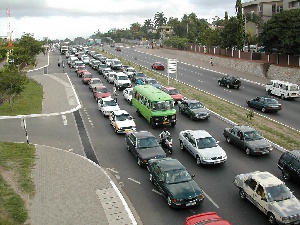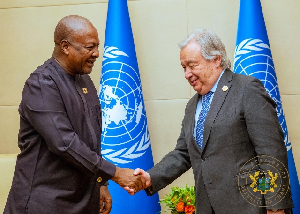The National Insurance Commission (NIC) -- the insurance regulator -- has asked insurance companies to hold on with implementation of the new motor insurance premiums to enable the Finance Ministry inform the presidency about the agreed decision of insurers.
It is expected that the decision of the NIC will delay use of the new tariffs planned for implementation on July 1st, 2015 by about a week.
The Deputy Commissioner of Insurance, Simon Nerro Davor, who notified the insurance firms of the latest decision in a correspondence to them said: “It has become necessary to inform you that the new tariffs agreed with the Ministry of Finance are yet to be brought to the attention of the President.
“The Minister of Finance (Seth Terkper) has therefore asked that we give him up to a week to brief the President accordingly before the start date. You are therefore asked to hold on and a new implementation date will be communicated to you as soon as possible.”
The latest information from the NIC can be seen as a setback to the insurance companies’ attempt to revamp the motor insurance portfolio in order to prevent it from collapsing amidst increases in claims.
Plans by the insurance companies to increase motor insurance premiums earlier in June this year hit the rocks following resistance from commercial motor unions in implementing a proposed tariff structure that could have seen third party motor insurance premiums go up by about 800 percent.
However, after several consultations, the insurers and other stakeholders like the Finance Ministry agreed to slash the proposed third party motor insurance premiums by more than half.
As per the new agreed tariffs now awaiting the green-light from the regulator, annual premium for the least expensive motor insurance policy -- third party insurance -- will now cost Gh¢252 for private cars instead of the initially proposed Gh¢471.
Commercial taxis and mini-buses, otherwise known as trotro, will now buy the annual third party insurance at Gh¢367, down from the earlier planned Gh¢576.
Currently, third party insurance premium is sold at GH¢66.30 for individual private cars and Gh¢82.55 for commercial taxis.
As a result of the raise in third party insurance tariff, the cost of buying a comprehensive insurance policy will also go up automatically since there is a third party component in any premium paid for a comprehensive cover.
The increase in the motor insurance premium, as contained in the underwriting and implementation guidelines approved for implementation by the General Insurance Council and the industry regulator National Insurance Commission, was suspended for a month following protests from the Fuel Tanker Drivers Association and Ghana Private Road Transport Union (GPRTU) -- the largest umbrella-body of commercial vehicles -- which threatened to abandon them and set up their own insurance firm to cater for the needs of commercial drivers, as the increment will affect the cost of operations substantially.
The reduction in the premium has thus been met with positive reactions from the protestors, some of whom are still raising questions about the rationale behind the initially exponential increment when the insurers could do with a moderate one.
But some insurers have explained to the B&FT the increment was necessary as it was the first time in five years that motor insurance premiums have been increased to cater for increases in input costs of the insurance companies necessitated by increases in fuel and utility tariffs, as well as the unstable macroeconomic environment that has seen the cedi collapse.
“In 2010, when we last increased motor insurance premiums, the cedi was trading at Gh¢1.47 to a dollar. Today, it cost Gh¢4 cedis to a dollar. Within the same period, inflation has increased from 8.58 percent to 16.8 percent while fuel prices have also increased from Gh¢1.75 a litre to Gh¢3.3.
“Tariffs for utilities have also gone up, as have road traffic accidents with the ever-increasing liabilities assumed by underwriters -- both under the third party injury and death and own-damage claims. There is no doubt that to continue charging the same premiums would eventually collapse the motor portfolio and incapacitate our ability to effectively meet our obligations to policyholders and third party victims of motor accidents,” they argued.
They said the increment will help insurance companies to be more solvent and support third party road accident victims by paying claims when they fall due.
Business News of Friday, 3 July 2015
Source: B&FT













